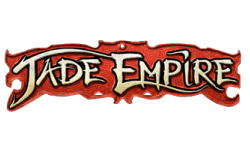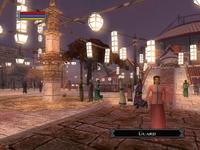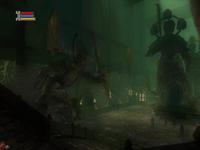|
|

|
PLATFORM
|
PC
|
BATTLE SYSTEM
|

|
INTERACTION
|

|
ORIGINALITY
|

|
STORY
|

|
MUSIC & SOUND
|

|
VISUALS
|

|
CHALLENGE
|
Adjustable
|
COMPLETION TIME
|
20-40 Hours
|
|
OVERALL

|
+ Frenetic, entertaining combat
+ Engaging dialogue and world
+ Worthwhile side quests
+ John Cleese
- Dragonfly shooter isn't fun
- Needless fake language voicing
|
Click here for scoring definitions
|
|
|
BioWare could have continued along the Knights of the Old Republic path after developing that game. Instead the company struck out along a different path and made Jade Empire, a fascinating title set in a land very much like China — though with a few important differences. The setting may be new, but the methods of progressing through its scenarios are familiar to BioWare veterans. Aside from its combat Jade Empire feels very similar to KOTOR, but this is hardly a bad thing and deserves to be experienced by anyone who hasn't taken the plunge yet.
After choosing from one of seven character models, the player is granted an idyllic beginning to the game spent learning its mechanics from benevolent Master Li and his other students. All is not well in the isolated locale of Twin Rivers, or else an incursion of pirates would not occur. Shortly after dealing with them Master Li confides that the protagonist is the last surviving Spirit Monk, a group slaughtered twenty years prior at the Emperor's order as a means of staunching a terrible drought. The requirements of being a Spirit Monk have not yet been fully comprehended before the protagonist is forced to act upon them when Imperial fliers burn Twin Rivers to the ground and spirit Master Li away.
BioWare made a great accomplishment in creating a fascinating world for Jade Empire with reams of history to explore at the player's convenience. The Jade Empire is a distinct place with a wide gamut of fascinating lore to learn, accompanied by the typically well-written scenarios BioWare creates. Its cast also exhibits a wide range of well-written personalities, from the gruesomely amusing Black Whirlwind to the cautionary tale of matrimonial detente Henpecked Hou relates. The second and third chapters of the game are rife with side quests to flesh out a variety of NPCs and the world of the Jade Empire, which at the very least are tolerable and generally quite a bit better than that to see through. Dialogue is copious and entertaining to read throughout the game.
 Guard? Where? Come out come out wherever you are....
Guard? Where? Come out come out wherever you are....
|
|
Jade Empire's combat definitely feels at home with the martial arts atmosphere presented, though it's not particularly deep. The protagonist takes a combat style and uses it in real time against a variety of foes, with the ability to swap between stances at any time. Martial disciplines fall under several general groupings such as transformation magic or weapon combat, and most of the enemies in the game require certain styles to be employed for success. Dodging enemy attacks by jumping behind their backs or rolling around the screen is encouraged, but blocking is always available if the opposition is diligent with its strikes. This is where the difficulty makes a tremendous difference, altering the damage players inflict and receive by a great amount. Enemies don't become a great deal smarter with an increase in difficulty, but the tactics necessary to take them down alter considerably if they refuse to die quickly. Fighting most adversaries is entertaining, but when button mashing is often the key to success, it can't be called deep. The many characters who join the protagonist along the way can also aid in battle, but the only guidance which can be offered to having them do anything useful is a shift from the direct attacks most can pull off to supporting the player in a nonviolent way.
Killing enemies certainly provides experience, but nearly as much can be obtained by completing quests not directly related to the central plot. In BioWare fashion, there tend to be charitable or blatantly thuggish ways of completing them, lending even more replay value to a title that already has plenty thanks to the many options for a lead. Jade Empire possesses plenty of things to do to extend its fairly short completion time to about thirty hours. BioWare opted for an experience that is amenable to being replayed with considerable differences in the plot instead of an overly long central storyline, a decision that pays off by making the game's narrative move constantly.
BioWare chose to streamline character development and inventory as much as possible for Jade Empire, so these aspects take up much less time than in KOTOR. Each level gained grants three points that can increase health, mana, or focus at the player's whim. Focus is a distinct statistic that governs how many times weapons can be used, but the other two are self-explanatory. The game also grants a different kind of points to improve the proficiency of any martial styles the player desires, but no selection of character abilities will ever be offered when dealing with the benefits of leveling. Inventory is streamlined also, with a selection of gems that fit onto the protagonist's amulet the only form of equipment to be found. The intended effect of minimizing time spent monkeying around in the menus is achieved, though proceeding through character development so quickly feels odd after BioWare's previous outing.
One relative detriment comes when moving between locations. The flying machines of Jade Empire are so large in number that shoot-em-up missions exist to blast a path through the horde of opposition. Doing so would be more enjoyable if the frame rate, remarkably solid in the rest of the game, stayed that way. Instead the player's ship seems to hop across the screen magically while projectiles and enemies that are nearly impossible to avoid due to the visual lag crash into it. Fortunately these endeavors are optional after the first one, making the trial easy to ignore.
 Mist is well known to possess insidious properties that attract nasty people and their lairs.
Mist is well known to possess insidious properties that attract nasty people and their lairs.
|
|
The protagonist's many dialogue options are inaudible, but every other line from a character in the game is uttered aloud by a fine stable of actors. At worst the performances are workmanlike, but most give the characters extra personality that would not necessarily be apparent from the words themselves — with the option to quickly click through if the result displeases at any time. Having John Cleese voice an otherwise minor role is a particular feather in the game's cap, as his distinctive quirks come through superbly. BioWare was apparently still enamored with having actors voice fictitious languages from its KOTOR time though, as a language created specifically for Jade Empire is spoken by a number of characters for no better reason than it could be done. The music and sound effects are fitting but rarely attention gathering, save a quite pretty main theme.
Jade Empire impresses with its sumptuous visuals also. Its cutscenes were sadly impossible to upgrade for PC resolution, making them look grainy next to the gorgeous in-game environments. BioWare made sure to use plenty of colors to keep the landscapes from getting monotonous, and the result is a title not afraid to use multiple palettes in order to keep things interesting throughout. The level of detail for the character models is also impressive, showing intricate animation that rewards attention.
Jade Empire spawned a lot of fans, deservedly so. Its chop-socky combat mechanics are entertaining and the world it creates is captivating enough to easily warrant repeated attention. One thing it apparently did not do was balance BioWare's books as well as more recent series, or else such a ripe universe for expansion would have seen some after its 2005 release considering its reputed high status among employees of the company. Definitely a shame, but one fine game is better than none.
Review Archives
|









